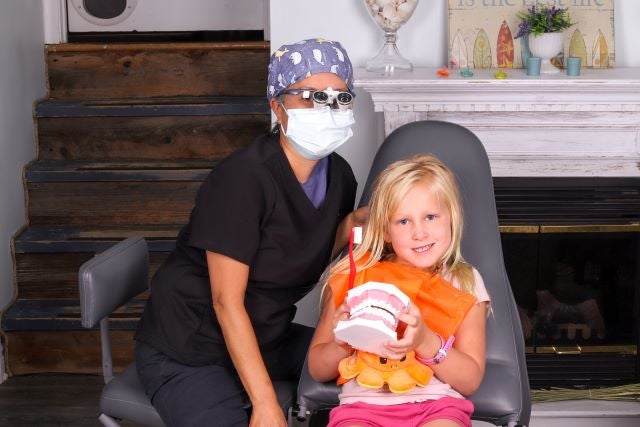Inspirations | Articles / Inspirations | Blogger articles
Mobile dental hygienist provides service at home

Using a plastic model, mobile dental hygienist Joy Maderazo teaches Emma St-Laurent the ideal way to brush her teeth, while comfortable at home.
Photo courtesy of Joy Maderaz
Montreal
- Thursday, November 25, 2021
By Lorri Benedik
Joy Maderazo studied dentistry in the Philippines before coming to Canada in 1996. After raising her kids, she studied dental hygiene at John Abbott College, graduating in 2010. She worked in dental offices for a decade before launching her mobile clinic. Maderazo has experience working with special needs children and adapts her craft in response to each patient’s unique sensitivities. She finds that seeing the dental hygienist at home often lessens the fear of going to the dentist and the different smells, sounds and bright lighting.
She offers these tips to parents:
- Talk to the dental hygienist: If possible, children should tell their hygienist if something hurts; cleaning should not be painful. The hygienist can apply an anaesthetic, change their speed or pressure. Parents: Tell the hygienist what they need to know about your child. Then, if possible, leave so the hygienist can connect and build trust with your child.
- Model the behaviour: If young children see parents brushing and flossing daily, they will develop the same habit.
- Supervise brushing: Even when kids can do it themselves, stay close to ensure they are brushing well for two minutes.
- Go electric: The rotation of an electric toothbrush is more efficient than the brushing action from a manual toothbrush. (A useful analogy: vacuum cleaner vs. broom.)
- Say no to fruit juice: Juice promotes tooth decay because of acidity that erodes enamel. Water is best. Swish around the mouth after eating to remove food particles.
- Motor issues: Some special needs kids have difficulty swallowing. Food stays between gums and cheeks. Rinsing with water helps dislodge it.
- Sticky foods: Seemingly healthy snacks (like granola bars) are problematic. Teeth have pits and fissures where food gets stuck; cavity-causing bacteria can form.
- Don’t linger: Sweet treats and soft drinks are best consumed quickly. Enjoy and rinse mouth with water.
- Saliva: When possible, wait 30 minutes after meals before brushing, so saliva can do its job of remineralizing teeth.
- Floss at bedtime: Flossing removes bacteria and disturbs plaque biofilm. Over time, biofilm thickens to become plaque, hardens and becomes calculus/tartar. (Floss sticks are great for young flossers.)
- Saliva/dry-mouth: Saliva production promotes digestion and the mouth’s self-cleaning system. Some medications reduce salivation resulting in more cavities. Products exist that stimulate saliva production.
- Cavities: The first sign can be tooth sensitivity but not necessarily. See a dentist at least once a year; x-rays, every year (or two) because tiny cavities between teeth are not visible – even to a dentist’s trained eye.
© Inspirations News, 2026









